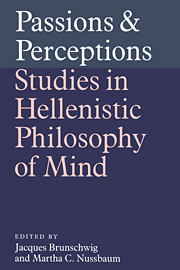Book contents
- Frontmatter
- Contents
- Preface
- Avant-propos
- Part I ETHICS AND PSYCHOLOGY OF HEDONISM
- Part II ATOMISM AND EPICUREAN PSYCHOLOGY
- Part III THE PASSIONS
- Part IV STOIC PSYCHOLOGICAL CONCEPTS
- Chapter 8 De la ‘nature phantastique’ des animaux chez les Stoïciens
- Chapter 9 Le concept de doxa des Stoïciens à Philon d'Alexandrie: essai d'étude diachronique
- Chapter 10 Seneca on reason, rules, and moral development
- Chapter 11 Chrysippus on psychophysical causality
- Bibliography
- Subject index
- Name index
- Index of passages cited
Chapter 10 - Seneca on reason, rules, and moral development
Published online by Cambridge University Press: 22 September 2009
- Frontmatter
- Contents
- Preface
- Avant-propos
- Part I ETHICS AND PSYCHOLOGY OF HEDONISM
- Part II ATOMISM AND EPICUREAN PSYCHOLOGY
- Part III THE PASSIONS
- Part IV STOIC PSYCHOLOGICAL CONCEPTS
- Chapter 8 De la ‘nature phantastique’ des animaux chez les Stoïciens
- Chapter 9 Le concept de doxa des Stoïciens à Philon d'Alexandrie: essai d'étude diachronique
- Chapter 10 Seneca on reason, rules, and moral development
- Chapter 11 Chrysippus on psychophysical causality
- Bibliography
- Subject index
- Name index
- Index of passages cited
Summary
Diogenes Laertius reports that Zeno was the first to introduce the word ‘kathēkon’ and to write a treatise on the topic. He also suggests that, in connection with these reflections on kathēkonta, Zeno reversed Hesiod's well-known tag about the value of following good advice relative to that of knowing things for ourselves. According to Zeno,
The best man of all is the one who can accept another's sound advice,
Good also the man who knows all things for himself.
Although few things are so characteristic of the Stoics as their penchant for dispensing advice, Zeno's remark is initially rather puzzling. Surely, we might object, Hesiod is the one who has it right: merely following another's advice, whether in the form of specific individual instructions or more general rules, should hardly take precedence over knowing things for ourselves.
Zeno, however, apparently defended his own ranking by postulating a critical link between an ability to accept advice and action. A crucial prerequisite for praxis, he explained, is being capable of accepting and following the sound advice of others; by itself, knowing things on one's own holds no special guarantees with respect to one's actions. Yet, this added bit of explanation seems hardly less puzzling, especially given Zeno's overall endorsement of the Socratic claim that knowledge is sufficient for virtuous action.
- Type
- Chapter
- Information
- Passions and PerceptionsStudies in Hellenistic Philosophy of Mind, pp. 285 - 312Publisher: Cambridge University PressPrint publication year: 1993



